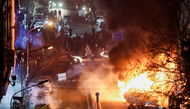By Kim Sung-jin
Staff Reporter
Vice Minister of Finance and Economy Kwon Tae-shin, center, keeps a straight face prior to an emergency meeting to discuss steps to curb the appreciation of the won against the dollar with senior ministry officials and the Bank of Korea early in the morning at the Korea Federation of Banks headquarters in central Seoul, Friday. The government plans to ease rules to encourage the flow of dollars out of the country as a means of stabilizing the currency market.
/ Yonhap
South Korea will fully liberalize outbound real estate investments for Korean individuals and businesses this year.
The Ministry of Finance and Economy (MOFE) said Friday that it would instantly raise the $500,000 ceiling on direct investments for purchasing overseas real estates to $1 million, and the cap on Korean businesses’ direct overseas investment to $10 million, from current $3 million.
The measures are aimed at coping with the recent, rapid gain of the Korean currency by easing the foreign currency oversupply. The foreign reserve glut is fueling the strengthening of the Korean won, according to the ministry.
The bold step is forecast to accelerate and widen Korea’s capital account liberalization.
The Bank of Korea predicts that Korea’s capital account liberalization ratio would rise to 85.1 percent in 2006 from 59.4 percent last year. The ratio for 29 Organization of Economic Cooperation and Development (OECD) member countries average at 89.3 percent.
The U.S. tops in capital account liberalization with its ratio standing at 95 percent, trailed by Japan (86.1 percent), Germany (89.1 percent) and the U.K. (86.1 percent).
The MOFE said the government has decided to boldly scrap all outbound investment limits by year’s end to encourage Koreans’ overseas investments.
With recent rally of the won pushing the Korean currency to an eight-year high Thursday, senior officials from economic ministries and the Bank of Korea held an emergency meeting to discuss the sudden sharp appreciation of the won at the Korea Federation of Banks headquarters in downtown Seoul early Friday morning.
Vice Minister of Finance and Economy Kwon Tae-shin said the government would not ``sit idle’’ looking at the volatile market conditions, and mobilize all possible tools to stabilize the foreign exchange market.
The won is trading at values that have never been seen since the 1997 Asian currency crisis. The won closed at 987.30 per dollar Thursday, the strongest since Nov. 14, 1997. The won began trading at 995 per dollar Friday and closed at 988.1 won.
Noting that the won’s rally since last month is “worrisome’’ and “abnormal,’’ Kwon said, ``if the won continues to appreciate further, the negative impact of the appreciation on our economy could grow too.’’
``To quickly stabilize the foreign exchange market and minimize the negative impact on the Korean economy, we will use all powers granted to the financial authority,’’ Kwon said.
To prevent the transitory gush of inbound foreign currencies from strengthening the won further, the government said it would temporarily curb unnecessary attempts to raise funds through foreign loans, while tightening its regulations for foreign exchange speculations.
In line, the government decided to abolish the ceiling on the premium benefits of the Korea Export Insurance Corp.’s foreign exchange fluctuation insurance for small and medium enterprises, (SMEs) to let SMEs better cope with the swollen foreign exchange risks.
sjkim@koreatimes.co.kr
스마터리빙
more [ 건강]
[ 건강]이제 혈관 건강도 챙기자!
[현대해운]우리 눈에 보이지 않기 때문에 혈관 건강을 챙기는 것은 결코 쉽지 않은데요. 여러분은 혈관 건강을 유지하기 위해 어떤 노력을 하시나요?
 [ 건강]
[ 건강]내 몸이 건강해지는 과일궁합
 [ 라이프]
[ 라이프]벌레야 물럿거라! 천연 해충제 만들기
 [ 건강]
[ 건강]혈압 낮추는데 좋은 식품
[현대해운]혈관 건강은 주로 노화가 진행되면서 지켜야 할 문제라고 인식되어 왔습니다. 최근 생활 패턴과 식생활의 변화로 혈관의 노화 진행이 빨라지고
카테고리 최신기사
- 4기 폐암 치료
- 뜨거운 ‘韓日 동맹 라인’ 이토 AS→김민재 골 ‘열도 홀렸다’... 일본 “콤파니 황태자들, 완벽히 해냈다” 찬사
- 마인츠, 하이덴하임 2-1 꺾고 ‘꼴찌 탈출’
- ‘환상 1호골+최고 평점’ 김민재 특급 맹활약, 뮌헨에서 가장 빛났다... ‘17G 무패’ 압도적 우승 페이스
- 이재성이 마인츠 살렸다! 2경기 연속 ‘미친 택배’ 도움... 마인츠, 하이덴하임 잡고 드디어 ‘꼴찌 탈출’
- 한국 U23 아시안컵 8강 상대 ‘호주’ 확정... 중국은 D조 2위 진출
- ‘낯설다’ 손흥민, 15년 만의 첫 ‘겨울 시즌’ 드디어 시작... ‘황제’ 메시와 맞대결도 ‘개봉박두’
사람·사람들
more
인터뷰-한국어진흥재단… “한국어 확대 체계적으로”
차세대 한국어 및 한국문화 교육을 목표로 활동해 온 한국어진흥재단이 2026년 제16기 이사회에서 유니스 이 이사를 신임 이사장으로 선출하며 …

캘리포니아 태권도협회 이취임식
캘리포니아 태권도협회(CTU) 신년회 및 회장 이·취임식 행사가 지난 10일 오렌지카운티 한인회관에서 열렸다. 이날 행사에서는 용호재 관장이 …
1945년 해방둥이 모임 신년모임
올해로 창립 11주년을 맞은 1945년생 해방둥이 모임(회장 최용자)은 지난 10일 해피 노래교실에서 신년모임을 열고 회원 간 친목을 다졌다.…
전남대 남가주 동문회 신년회
전남대 남가주 총동문회(회장 차흥주)는 지난 10일 아리수 식당에서 동문과 가족들이 참석한 가운데 2026년 신년회를 개최했다. 이날 참석자들…
도산사업회 신년하례식 26일 아로마센터 5층
미주 도산안창호기념사업회(회장 데이빗 곽)는 오는 26일(월) 오후 5시30분 LA 한인타운 아로마센터 5층 더원 뱅큇홀에서 ‘2026 신년하…
많이 본 기사
- 트럼프 “건강보험사 대신 개인에 보조… 1
- 국립공원 방문시 시민권·영주권 확인한다
- 대장암 위험 높이는 생활 속 잘못된 습관 5가지
- 식후 ‘블랙커피’ 한 잔, 당뇨약만큼 효과 있다
- 미네소타서 또… 이민단속 저항 남성 총맞아, 시위 격화
- ‘그린란드 담판’ 깨졌다… 덴마크·나… 1
- 치명적 독버섯 ‘데스캡’ 확산 비상
- 결혼 앞둔 한국인 남성 태국 열차 사고로 참변
- 기대 수명 120세 시대… 알츠하이머는 최후의 불치병으로 남을까
- LA 올림픽 티켓 예약 열기 첫날부터 ‘후끈’
- [인터뷰] “당뇨, 몸이 보내는 신호 잘 살펴보고 대처”
- 캔디스 조 커미셔너 가주 민권위원 지명
- ‘별거 고백’ 슈, ♥임효성과 두 달 째 연락 두절.. “화해하고 파” 속내 고백
- “‘BTS 초청’ 선거 공약 현실이 됐어요”... ‘아미’ 멕시코 장관, 진과 만남 영상 공개
- 보모와 불륜 북VA 남성, 완전범죄 노리고…
- 김우빈, ‘♥신민아’가 기다리는 집으로..새신랑의 퇴근길
- 한국 ‘여권 파워’ 6년 연속 최상위권
- 신차 가격 고공행진… ‘100개월 할부’까지 등장
- 고가 주택 ‘찔끔’…저소득층은 ‘인상 폭탄’
- 미, 그린란드 사려면 얼마 줘야하나?
- 금리 하락에 전국 주택거래 회복세
- 강다니엘, 내달 9일 육군 현역 입대
- 테슬라, 자율주행 소프트웨어 구독제
- 롱텀케어가 있는 어뉴이티?
- ISS 우주비행사 4명 지구 안착… 건강문제로 조기 귀환
- 서울대 국제하계강좌 수강생 모집
- 한미시니어 센터 다양한 프로그램
- 국적이탈 수속에 2년이나 걸리다니⋯ 2
- 피프티피프티 측 “안성일 5억 배상 판결=인과응보, 전 멤버 3人 등에 130억 손배소”
- 이란 공격 보류… 항모전단은 중동으로
- 2026년, 401(k) 납입부터 다시 정비하자
- 1945년 해방둥이 모임 신년모임
- 2026 밀라노·코르티나담페초 동계올림픽 스키 종목
- 한인 2세들 ‘족쇄’ 국적법 신속 개정해야
- 구글, AI 생태계 장악 속도… 맞수 애플도 손잡았다
- 尹 체포방해 1심 징역 5년… “일신·사익 위해 경호처 사병화”
- 자동차 재산세 폐지 법안 나올까
- “대기자 명단 신청 접수하세요”
- 젊은 남녀가 춤의 마력에 빠져 금지된 사랑 이야기
- 뉴욕한인회‘제123주년 미주한인의 날’ 기념식 성황
- <정태문의 팝송산책>
- 호주오픈 18일 개막… 알카라스 vs 신네르 결승서 만날까
- 국제유가, 하루 4%대 급락
- [부고] 최영희씨 별세, 24일 추모예배
- 운전면허증 발급시 유권자 자동등록
- 타운 ‘팟홀’ 379개… “신고해야 신속 복구”
- [조지 F. 윌 칼럼] 올 중간선거를 덜 불쾌하게 만드는 길
- [본보 후원 디즈니홀 콘서트] ‘피아노의 신성’이 펼치는 서정… 섬세한 시적 대화
- ‘여수 밤바다’에 물렸다면… 여수 섬·바다 어때요?
- 뜨거운 ‘韓日 동맹 라인’ 이토 AS→김민재 골 ‘열도 홀렸다’... 일본 “콤파니 황태자들, 완벽히 해냈다” 찬사
1/5지식톡

-
 한국 안경을 무료 배송으로 받아보실…
0
한국 안경을 무료 배송으로 받아보실…
0안녕하세요. 서울 안암동에 위치한 ‘보고싶다 안경원’입니다.저희는 다년간 한국 고객분들께 착용감 좋은 안경테와 한국안경브랜드,고압축 도수 렌즈를 합리적인 가격에 제공해온 안경 전문점입니다.이번에 해외 배송이 가능해…
-
 미 육군 사관학교 West Poin…
0
미 육군 사관학교 West Poin…
0https://youtu.be/SxD8cEhNV6Q연락처:wpkapca@gmail.comJohn Choi: 714-716-6414West Point 합격증을 받으셨나요?미 육군사관학교 West Point 학부모 모…
-
 ☝️해외에서도 가능한 한국어 선생님…
0
☝️해외에서도 가능한 한국어 선생님…
0이 영상 하나면 충분합니다!♥️상담신청문의♥️☝️ 문의 폭주로 '선착순 상담'만 진행합니다.☎️ : 02-6213-9094✨카카오톡ID : @GOODEDU77 (@골뱅이 꼭 붙여주셔야합니다…
-
 테슬라 자동차 시트커버 장착
0
테슬라 자동차 시트커버 장착
0테슬라 시트커버, 사놓고 아직 못 씌우셨죠?장착이 생각보다 쉽지 않습니다.20년 경력 전문가에게 맡기세요 — 깔끔하고 딱 맞게 장착해드립니다!장착비용:앞좌석: $40뒷좌석: $60앞·뒷좌석 …
-
 식당용 부탄가스
0
식당용 부탄가스
0식당용 부탄가스 홀세일 합니다 로스앤젤레스 다운타운 픽업 가능 안녕 하세요?강아지 & 고양이 모든 애완동물 / 반려동물 식품 & 모든 애완동물/반려동물 관련 제품들 전문적으로 홀세일/취급하는 회사 입니다 100% …
케이타운 1번가
오피니언

한인 2세들 ‘족쇄’ 국적법 신속 개정해야

노동법 준수로 공정의 새해 열자
 조지 F·윌 워싱턴포스트 칼럼니스트
조지 F·윌 워싱턴포스트 칼럼니스트 [조지 F. 윌 칼럼] 올 중간선거를 덜 불쾌하게 만드는 길
 최규성 삼성서울병원 이식외과 교수
최규성 삼성서울병원 이식외과 교수 [로터리] ‘토의 간’
 전병두 서북미수필가협회 회원
전병두 서북미수필가협회 회원 [금요단상] 꿀벌과의 인연
 심상용 / 서울대 미술관장
심상용 / 서울대 미술관장 [미술 다시보기] 모네와 연작의 경제학
 김정곤 / 서울경제 논설위원
김정곤 / 서울경제 논설위원 [만화경] 애플·구글 ‘적과의 동침’
 한 영 재미수필가협회 회장
한 영 재미수필가협회 회장 [한영의 독서칼럼] 햇살을 향해 헤엄치기
 이규민 한식진흥원 이사장
이규민 한식진흥원 이사장 [로터리] 시간을 담그는 문화, 한국의 장
1/3지사별 뉴스

뉴욕한인회‘제123주년 미주한인의 날’ 기념식 성황
뉴욕한인회(회장 이명석)가 13일 맨하탄 뉴욕한인회관에서 개최한‘제123주년 미주한인의 날’ 기념 행사가 각계에서 활동 중인 1.5세 및 2세…
국적이탈 수속에 2년이나 걸리다니⋯

연방의회서 “한인 위상·한미동맹 제고” 한목소리
한인 이민자들이 미국에 도착한 123주년을 기념하고 한인들의 미국 사회에의 기여를 알리는 ‘제 21회 미주 한인의 날’ 행사가 13일 연방의회…
보모와 불륜 북VA 남성, 완전범죄 노리고…

한미수교 100주년 기념 조형물 재설치 가능성 보인다
샌프란시스코 공원에 설치되어 있다 철거되어 창고에 보관중인 한미수교 100주년 기념 조형물이 다시 설치될 가능성이 열렸다.한국 국회 재정경제기…
재미한국학교협의회

오늘 하루 이 창 열지 않음 닫기 



















































.png)


댓글 안에 당신의 성숙함도 담아 주세요.
'오늘의 한마디'는 기사에 대하여 자신의 생각을 말하고 남의 생각을 들으며 서로 다양한 의견을 나누는 공간입니다. 그러나 간혹 불건전한 내용을 올리시는 분들이 계셔서 건전한 인터넷문화 정착을 위해 아래와 같은 운영원칙을 적용합니다.
자체 모니터링을 통해 아래에 해당하는 내용이 포함된 댓글이 발견되면 예고없이 삭제 조치를 하겠습니다.
불건전한 댓글을 올리거나, 이름에 비속어 및 상대방의 불쾌감을 주는 단어를 사용, 유명인 또는 특정 일반인을 사칭하는 경우 이용에 대한 차단 제재를 받을 수 있습니다. 차단될 경우, 일주일간 댓글을 달수 없게 됩니다.
명예훼손, 개인정보 유출, 욕설 등 법률에 위반되는 댓글은 관계 법령에 의거 민형사상 처벌을 받을 수 있으니 이용에 주의를 부탁드립니다.
Close
x